The Story Mechanic Part Six: Talk The Line
Yager Games and 2K snuck up on us this year with Spec Ops: The Line. A game about the horrors of war, it garnered huge praise for its chilling story and impressive portrayal of Dubai, a dying city, tearing itself to pieces. With some uncompromising violence and grey moral issues, it instantly went to the top of the Story Mechanic’s “Must know More” list.
We recently interviewed Michael Kempson (Producer) about the game, the studio’s design philosophy, inspirations for The Line, and how to successfully build a game adapted from an existing story.
Be warned, this article contains MASSIVE spoilers for Spec Ops: The Line. If you don’t want the game’s story spoiled, well, frankly I’m surprised you are still reading. Go and finish the game. Then come back for the insight.
Spec Ops: The Line is famous for being an adaptation of Joseph Conrad’s book, Heart of Darkness. However, it feels to me that The Line is a closer adaptation of the other famous Heart of Darkness inspired piece, Apocalypse Now, than the book itself. From the military setting to the visual language (Willard’s face often split into shadow and light, mirrored in Walker’s increasing scarring down one side of his face, for example), it seems as though, whilst the original idea of Heart of Darkness is shared in Coppola’s work and yours, The Line draws more heavily on Apocalypse Now than Conrad’s book. Can you talk about the inspirations for the game? Why did you feel they were appropriate for a transition to games? What were the most important touchstones?

To answer directly, we definitely identify a lot with Apocalypse Now, for many of the reasons you already noted. The ultimate inspiration though for Spec Ops: The Line was a growing feeling that the narrative style of military genre games in the last few years has been lacking. We looked hard at Apocalypse Now, and thought about what it did for the military genre in movies at that time and saw an opportunity to bring that to the games industry. Luckily YAGER and 2K were very much in the same mind on this topic so when the opportunity came about to be able to do something like this, both parties were really excited at the prospect.
Dubai is vital to the storytelling in The Line. From the graffiti on the wall, to the increasing desolation and juxtaposition of wealth against refugees, every aspect of the world is key to the player’s understanding of the story. What work was required by the studio to make sure that the level design, environment art, scripting, design and narrative teams were all on the same page to deliver this consistency? What did you learn that you could take forward to future projects?
It was a very challenging process right from the outset, but we’re very happy with the outcome. The biggest key to that consistency was solid communication and transparency between all departments at all times during development. Obviously narrative was our focus during this endeavour and that proved to be a really useful way to ground all the teams on the same level. It meant that even outside of the narrative teams, designers, artists and level designers were always asking themselves what every stage meant for the narrative at that point in the game. Almost all of our discussions centred upon this during production to achieve a consistency we felt worked. The principle at play here though is that all teams have a focal point from which to discuss and develop from, rather than isolated departmental principles, which is something we will definitely be taking forward.
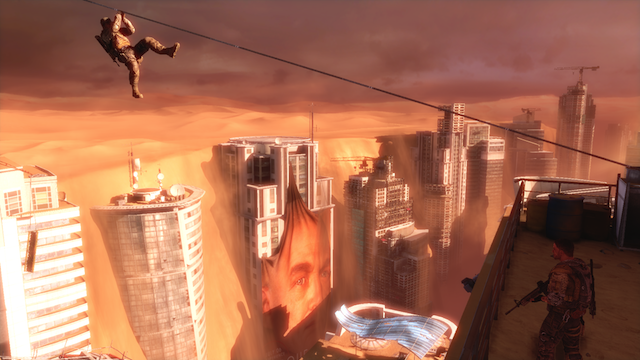
Superficially Dubai is a very different location to Africa’s interior and the war torn jungles of Vietnam. Was this a conscious choice? Despite looking different, what aspects of the jungle settings inspired Dubai? Was there anything you wanted to include that had to be left out?
We didn’t take very much inspiration from the jungles in the previous works, instead we aimed to embrace everything we could within Dubai as a location and really focus on it, simply as we felt it had more to offer. If anything carried through at all, it was most certainly the juxtaposition you spoke of earlier. A setting which, if it had been left untouched by war and devastation, would be vastly beautiful. For me and others here we would have loved to have created our version of Ski Dubai. It encapsulates so much about Dubai that it would have been brilliant to include it. We managed to reference it quite a lot in the environment to keep it in players’ minds but it would have been great to actually go there.
The game has some incredible violent moments (the white phosphorous, Lugo’s hanging and its immediate aftermath) where the player is forced to watch the consequences of their actions. Loading screens attempt to pass messages to the player but how important to the team was it to communicate the game’s central message? Were you ever worried about crossing the line yourselves and the backlash that could have created?
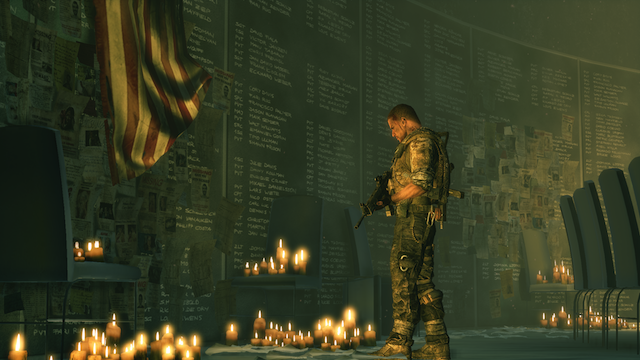
It was definitely a concern at times, but we did have very talented and responsible narrative and design teams on board who were very much in touch with the core principles of the story and game. I think in the end it worked out simply due to the fact that we all had a very clear goal of context, reasoning and understanding when it came to the moments you listed.
For me, the biggest difference in pure narrative terms between Spec Ops: The Line and Heart of Darkness (and Apocalypse Now) is the motivation of the main character. In both Apocalypse Now and Heart of Darkness the main character is directed by superiors to find Kurtz. In Spec Ops: The Line, Walker makes his mind up that the team must find Konrad. At no point does he receive that directive from a superior. Why did the design team make the decision to change the main character’s motivation? What effect does this have on the player? Do you think the game would feel different if you followed the narrative of Heart of Darkness and Apocalypse Now more closely?
It was actually that way for the majority of development. The reasoning being that if you were to perhaps add that layer of servitude to Walker, one could claim the decisions were dictated to him via the ‘unseen’ chain of command. The only people we have chime on these things with Walker are the squad who are with you through these events and offer differing first hand takes on what is transpiring, which we just found more interesting.
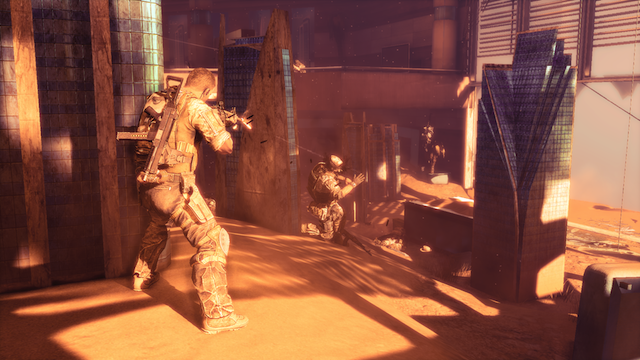
On the subject of Walker, the game reveals at its end that he is a very unreliable narrator. This is an interesting choice, because usually player experience is so sacrosanct. Why did you go down this route? How did you want the ending to affect the player’s experience.
This is a very tough question, because you’re correct in regards to the player experience, but ultimately it was necessary to allow the player to really fall into the experience with Walker, really see things the way he saw them. Perhaps even start to “understand” Walker’s reasoning behind the choices they both make together. I don’t really believe that we completely pull the rug by the end of the game. We do give it a strong tug though!
True adaptations of books and films (rather than just cash-ins) are very rare in the games industry. Even rarer are those that deviate from the source material whilst sharing the same message. Did the studio feel as if this was a huge undertaking? Did you ever acknowledge that this was a risk? What were the advantages?
It certainly felt like a huge undertaking and a really huge responsibility. Like I mentioned earlier we really felt that there was room for improvement in the military genre as far as the narrative goes, a lot of people had been talking about it publicly in the media as well. During the project there was a great sense of responsibility to deliver on this. The advantage is that, as a studio, we really came together on a lot of what we think are the core principles and ideas to be able to deliver a narrative experience of this nature, and we get to take the knowledge we gained to future projects.
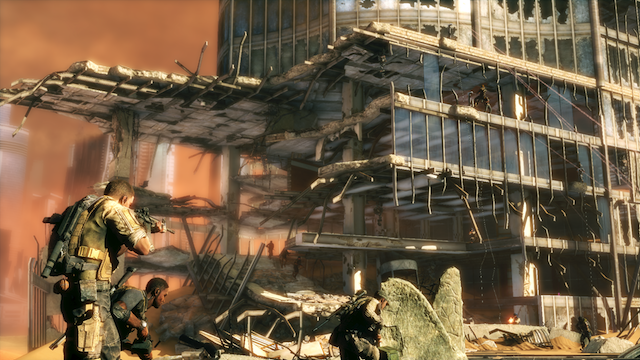
Were there any specific complications of adapting film and book narrative into game narrative? Can you discuss these?
The balance between players’ experience and the experience of the character was definitely a huge challenge and very difficult to nail down. Trying to consistently hit that all the way through the game was incredibly difficult for all. You end up trying to pre-empt both the interactive impact on the player, how does that make them feel and think as well as the non interactive parts. Then, to really mix things up, there are the decision scenes where the player interacts and should feel a certain way, but the way the player’s character reacts also has to make a certain amount of sense to the player.
The Line has received some criticism for being a “generic” shooter. Do you believe, in gameplay terms, it is generic? If not, why? It seems to me that the use of familiar gameplay tropes in The Line is to make the game question other similar games. Is the juxtaposition of the “shoot first, kill everyone rescue mission” there to make players ask questions of what they are doing?
A big driving force when developing the game was accessibility; we never wanted the basic controls of the game to interfere heavily with the user experience. People could take that the wrong way, but for us it was a genuine problem. Take, for example, what I said in the previous answer on the challenges of how to encourage the player to think at any given time. The last thing you want is to increase the chance of unnecessary frustration of the player colouring their perception of an event in the game. For instance, in the mortar scene mid way through the game, from a gameplay stand point it would have been far more interesting to create a more gameplay centric ‘mini game’ at that point. However, we did not want that to be a challenge; the narrative angle for that particular moment is that it was supposed to be easy. It was too easy for you and your character to commit that act. If it had been extremely fun or extremely difficult or both, no matter the outcome you’d more likely be giving yourself a pat on the back no matter what the consequences were.
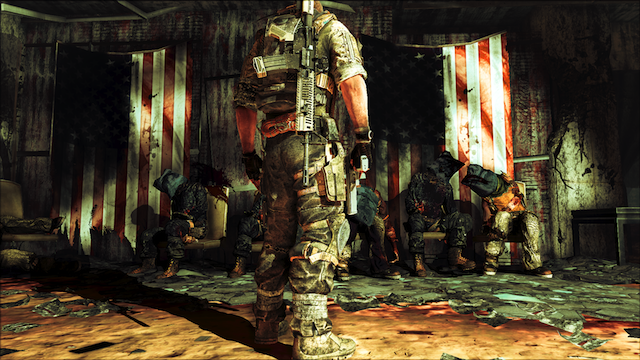
In light of the game’s ending, the role of the CIA was thrown into question because it is clear that Walker’s narrative cannot be trusted? What was the CIA’s purpose in Dubai? Particularly Gould? From a design standpoint, why were they included? What do you believe that they add to the story?
I feel the CIA fills a certain gap we spoke of earlier. You mentioned that Walker doesn’t have a command that he is answering to, he makes all his own calls. I think the CIA draws attention to this fact by operating in a very clear structure with very clear orders: “Make the connection between the current state of Dubai and General Konrad’s disappearance, for the sake of the U.S government.” By the end of Walker’s interactions with the CIA we give the player a chance to make a call on how they feel about people operating within that set of parameters.
I found Spec Ops The Line difficult, particularly at the end, with aggressive A.I. and checkpoints spread wide apart. We’re you concerned that frequent player deaths would have a negative effect on the story telling? How did you balance the duel concerns of making a challenging game and an interesting story?
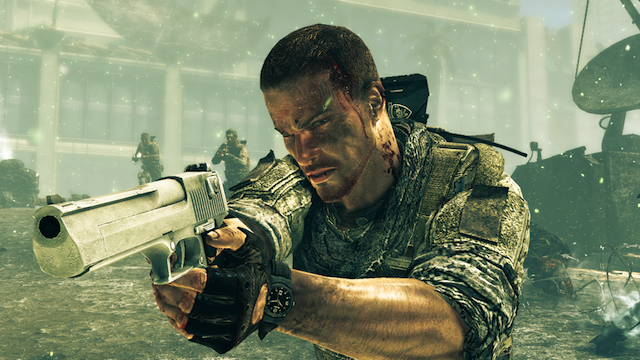
Finding the balance, that sweet spot of player and character experience was really tough and no more so than in the game’s difficulty. A lot of the time we approached it with the combined mind-set of traditional game design and what we wanted to get from the player on a story level. You mentioned the end of the game where it does get pretty tough for some players. It was really important for the end of the game that the player feels overwhelmed, unsure if they can achieve what they need to and at the very end, ideally, a kind of “blissful exhaustion” which is close to where we put Walker at the end of the game.
After the game has ended, and the truth is revealed, how much is there for a player to go back for? Are the clues in the ending more obvious the second and third time through?
The two things I recommend to people who are playing again are firstly, collect the intel. A lot of people often think of these things as pretty arbitrary but they do offer some interesting glimpses prior to and during the Dubai evacuation and individuals you contend with during the game. Secondly, play through again, and attempt a different ending. Often movies come out with director’s cuts or extended cuts which offer the claim “completely changes the movie!”. I’m not sure if that is true in our case, but I always like to talk to people about all of the endings and which they feel is the most definitive “end”.
That’s where our talk with Michael Kempson came to an end. We’d like to thank Michael for his time, you can find the Story Mechanic article here at GodisaGeek.com at 5pm every other Friday. See you in two weeks!




